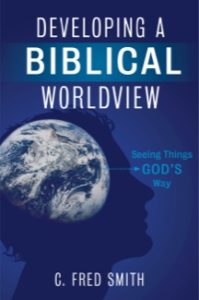By Josh Aguilar
 Developing A Biblical Worldview: Seeing Things God’s Way
Developing A Biblical Worldview: Seeing Things God’s Way
By C. Fred Smith (B&H Publishing, 2015)
Summary
A worldview is like our hearts, everyone has one. Just as our heart functions and pumps life through our bodies, our worldview becomes the source of how a person “understands reality, yourself, and those around you, and how you solve problems” (5).
Therefore, a worldview becomes the fountain of what a person believes and how they live in this world. It is “the comprehensive picture of reality which affects everything they do” (1). For this reason, as believers, pilgrims in this world, it is imperative to develop a biblical worldview, to help us see the world as God sees it.
In the introduction, C. Fred Smith introduces a broad scheme within which worldviews may be understood—atomic, oceanic, and relational, which is symbolized by billiard balls, the ocean, and a net. All worldviews fall into one of these schemes, for the sake of time and space we cannot go into to detail (enlightening and worth buying the book for). Smith begins to make the case that a Biblical worldview is relational because “the Bible sees us as interconnected. What is done by one affects others, even affecting future generations” (7). Smith continually returns to these foundational schemes throughout the book to point out how we sometimes have accepted an erroneous perception concerning the world and how it is designed to function.
When worldview is the topic, there needs to be a paradigm, which we use to discuss basic, foundational ideas, which answer questions about our world. Smith breaks his paradigm down to four questions: Who are we? Where are we? What is wrong? What is the answer? Throughout the first four chapters, Smith develops how the Bible answers these questions and does a masterful job explaining and displaying the practical applications of believing these truths. In the remaining chapters of the book, Smith breaks down how Noah, Moses, and David would answer these questions. He does a great job explaining how America has answered these questions throughout each generation. Smith helps us apply this paradigm when analyzing pop culture. He also gives us great keys to developing a biblical worldview and issues which may be barriers.
Benefit for Pastoral Ministry
Smith provides a foundational framework on how to develop and apply worldviews, which is extremely beneficial for ministry. In his chapter, “What Is Wrong?” Smith points out something which may be obvious to most of us—sin is wrong. Smith continues to apply this question to particulars and explains how we can apply these particulars in our churches, communities, and nation. Smith points out “since we are so immersed in a world that holds an atomic worldview, this worldview often infects the churches.”
If your congregation only really “exists” for an hour on Sundays and then scatters like billiard balls across a table, part of the real answer to the “What Is Wrong?” question will certainly be we are not relational—our lives are too separate; “we do not participate in a common life together and thus are not living Biblically” (66). As Smith points out, once you know what is wrong, you can begin to offer the solution to the problem.
Another aspect of Developing A Biblical Worldview which I found highly beneficial, is the chapter on pop culture. Pop culture is an influencer to people in our churches, there is no denying this fact. Smith gives us examples and trains the reader on how to apply a biblical worldview paradigm to pop culture. Through this, the reader may discover a sometimes shocking reality: we are adopting pop culture’s worldview, often without even realizing it.
As a lover of books, I know I cannot read all of them, so I try to plan my reading. In my plan, I try to read one new worldview book a year, to refresh, renew, get new ideas, and see what more I can learn from the mind of others. If you plan your reading, plan to put this book on your shelf, it is a valuable resource.
Reprinted with permission from LifewayPastors.com.








